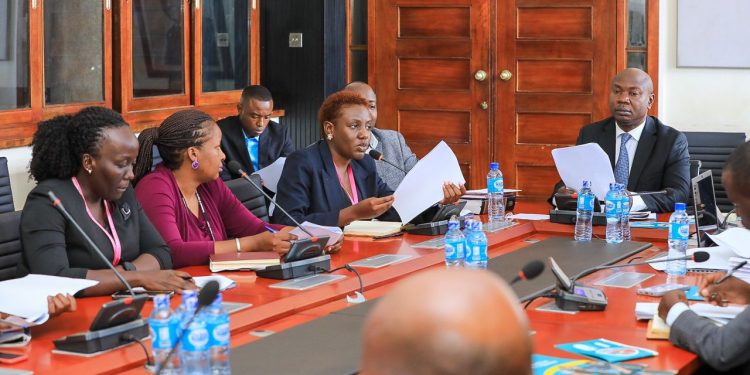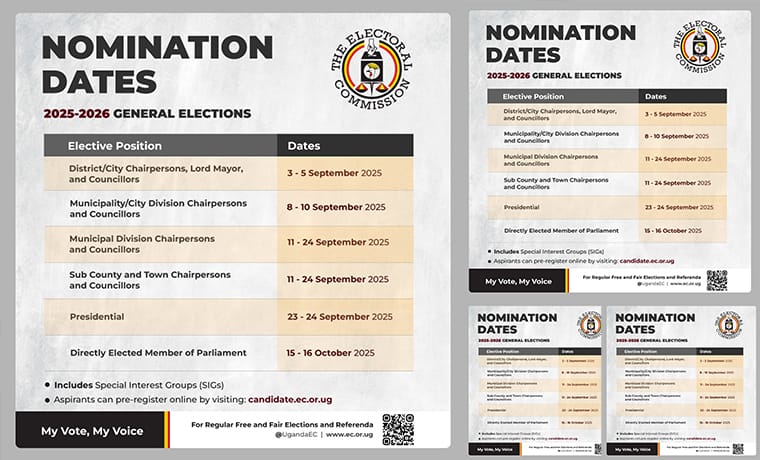By Mulengera Reporters
Land rights activists have called on Parliament to reject a proposal in the Marriage Bill, 2024, that mandates spouses to share debts incurred during marriage. The activists argue that the provision fails to account for power imbalances within households and could lead to financial abuse.
The appeal was made by Mwebe Kalibala, a member of the Stand for Her Land (S4HL) Campaign Coalition, during a presentation before the Joint Committee on Legal and Gender Affairs on February 18, 2025. The committee is currently scrutinizing the bill, which was tabled by Sarah Opendi (Tororo DWR). Kalibala and his team urged Parliament to leave debt management to individual couples, citing difficulties in proving mutual consent.
“The clauses on debt-sharing emphasize obtaining consent from all spouses. However, consent can be coerced or given under duress. A spouse acquiring a loan may claim it is for family needs, yet the other partner may have no real say in the decision,” Kalibala explained.
His concerns were echoed by Rebecca Atayo, Legal Officer and Board Liaison at LANDnet Uganda, who called for the removal of the debt-sharing clause. “We recommend deleting this clause entirely. There is no need to transfer liability for debts. If someone incurs a debt, they should be responsible for it, even if it is for family necessities,” she stated.
Financial Abuse
The activists warned that the provision assumes transparency in financial matters within marriages, which is often not the case. Atayo noted, “This provision downplays the power dynamics in households by assuming that spouses disclose their financial liabilities. Women, in particular, may not always understand the documents their husbands sign, making them vulnerable to financial abuse.”
Opendi’s proposed Clause 55 states that:
- If a debt is incurred with the consent of the other spouse, it becomes a shared family liability.
- If incurred without consent, the debt remains the responsibility of the spouse who acquired it, unless otherwise agreed.
Property Rights
While opposing the debt-sharing provision, the activists welcomed the bill’s emphasis on property rights, saying it would bring clarity to the judiciary in divorce cases.
Kalibala noted, “Legislation on property rights is crucial to ensure judicial officers handle divorce cases effectively. Men and women do not enter marriage on equal footing—one partner may already own property while the other contributes in other ways. The law must ensure fairness in property division.”
He highlighted inconsistencies in Ugandan court rulings on matrimonial property, arguing that a lack of a clear legal framework has led to judicial discretion, unpredictability, and perceptions of bias. “The Marriage Bill, 2024, provides much-needed guidelines on matrimonial property division. With minor modifications, it could ensure fairness and consistency in judicial decisions,” the coalition’s presentation stated.
Prenuptial and Postnuptial Agreements
The activists also backed provisions in the bill that introduce prenuptial and postnuptial agreements, arguing that such agreements could reduce disputes over property division during divorce.
“We fully support the introduction of prenuptial and postnuptial agreements,” Atayo stated. “This is a significant legal advancement that can help prevent conflicts over asset division. These agreements provide a clear framework for handling property matters and reduce legal disputes in the event of marriage dissolution.”
Clause 47 of the bill proposes allowing couples to execute agreements before or during marriage to determine ownership of property acquired individually or jointly. The agreements would also outline how matrimonial property should be distributed in the event of separation.
Atayo emphasized that these agreements would help protect personal assets, particularly for individuals with substantial wealth, businesses, or inheritances. “Prenuptial and postnuptial agreements safeguard personal assets, ensuring they remain separate property if a marriage ends,” she added.
Liability Provisions
The activists expressed concerns about another clause that allows liabilities incurred before marriage to be shared if the property becomes matrimonial. They proposed that liability should only be shared if both spouses explicitly agree.
“The bill should clearly state that a liability should only become shared when both parties have expressly agreed. This prevents spouses from being held responsible for debts they did not consent to or benefit from,” Atayo argued.
Clause 51 of the bill currently states that pre-marital liabilities remain the responsibility of the individual who incurred them unless the related property becomes matrimonial. The activists proposed an amendment to require explicit consent before such liabilities are shared.
Ancestral Land
The activists also rejected a proposal to exclude ancestral land from the definition of matrimonial property, arguing that it would disadvantage spouses, particularly women, who contribute to its development.
Atayo stated, “The exemption in Clause 52(2) must align with constitutional principles of non-discrimination (Article 21) and affirmative action for marginalized groups (Article 32). Many rural women contribute to the maintenance and development of ancestral land, and they should have a beneficial interest in it.”
She emphasized the need to balance protecting future generations’ rights to ancestral land with addressing patriarchal practices that restrict women’s land ownership. “We must ensure that cultural traditions do not override women’s property rights,” she concluded.
The Marriage Bill, 2024, remains under review by Parliament, with activists urging lawmakers to make amendments that promote fairness, transparency, and protection against financial abuse in marriage-Parliament Watch. (For comments on this story, get back to us on 0705579994 [WhatsApp line], 0779411734 & 041 4674611 or email us at mulengeranews@gmail.com).

































